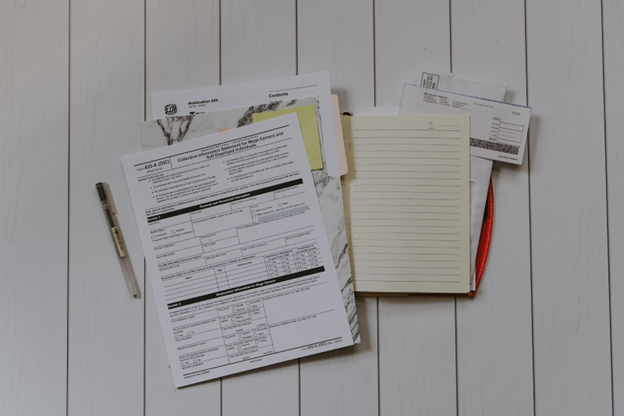Taxes can be complicated for anyone, but it’s a whole other level for independent artists. Maximize your tax savings– learn how to organize, file, and reduce your tax stress here. You’re juggling gigs, making money from multiple streams, and handling expenses that don’t fit neatly into typical tax categories. But taxes are non-negotiable, and missing the mark can mean costly penalties.
Tax season is riddled with questions for independent artists: “What expenses can I write off? Can I file taxes online? What if I mess it up?” Working with a tax pro like ICONAC can simplify the process.
Key Takeaways:
- Filing taxes as an independent artist is complicated. Multiple income streams, deductible expenses, and self-employment tax are just a few of the hurdles.
- Tax mistakes can be costly. Filing taxes alone can lead to errors, penalties, and missed savings.
Hiring tax experts can help you save time and money. With ICONAC, you get professional help tailored to artists’ needs, reducing tax stress.
Ready to make tax season stress-free? Reach out to ICONAC today and make filing taxes as an artist easier than ever.

The Common Tax Problems Facing Independent Artists
As an artist, you’re often considered self-employed, meaning taxes are your responsibility, not an employer’s. You may have income from freelance gigs, merchandise sales, and digital royalties. Each revenue stream has its tax implications, making the filing process feel like solving a complicated puzzle.
Here’s what tends to trip artists up:
- Multiple Income Sources: Different streams of income may mean different tax forms and rules. For example, you will receive 1099 forms for freelance work—each of which may be reported and taxed differently.
- Expense Deductions: Knowing which expenses you can legally write off can save you a lot of money, but the rules are detailed and hard to interpret.
- Self-Employment Tax: If you’re your own boss, you’re also responsible for self-employment tax, which covers Social Security and Medicare. This can be a big shock if you’re not prepared.
- Tax Forms Galore: W-9s, 1099s, Schedule C, and others—filing the wrong form or missing one altogether can lead to penalties.
- Estimated Quarterly Payments: As a self-employed person, you’re expected to pay estimated taxes every quarter. Miss one, and you could face penalties and interest charges.
For many artists, these hurdles make tax filing overwhelming. Without the right guidance, it’s easy to overpay on taxes, miss deductions, or make costly mistakes.
Did you know? Nearly 36% of self-employed individuals don’t pay taxes, often leading to penalties and added stress.
Why Tax Trouble Can Be Serious (And Costly)
The IRS doesn’t give out second chances easily. If you make one mistake on your taxes, you could be facing penalties, loss of income, or even legal trouble.

Here’s how getting your taxes wrong can affect you as an artist:
Missed Deductions Mean Lost Money
Artists miss out on significant deductions and the tax credit simply because they’re unsure of what’s allowed. For example, studio rental fees or traveling for an exhibition can all qualify as business expenses, but only if filed correctly.
Risk of Audits
Since freelance income and business expenses can be high, artists are more prone to audits, especially if there’s inconsistency in reporting. Inaccurate tax filings—whether due to genuine mistakes or lack of knowledge—can catch the IRS’s attention. An audit involves a thorough review of your records, and any identified errors could result in penalties, interest, or additional taxes owed.
Self-Employment Tax Pitfalls
Artists are responsible for paying both Medicare and Social Security. Miscalculating these taxes often leads to a “bigger-than-expected” tax bill come filing time. Not accounting for self-employment taxes could also mean underpaying throughout the year, resulting in fines for unpaid taxes.
Lost Time
Every hour spent combing through tax forms and receipts is an hour you’re not creating art. Taxes take time, and that time adds up—especially if you’re trying to do it all yourself without the right expertise. However, it’s not just about paying taxes—it’s about paying them correctly. And if you’re not a tax expert, that can be difficult.
Maximize your income, reduce your tax stress, and stay compliant with expert accounting insights made for artists like you!
Tax Basics for Independent Artists
Here are steps on how to file taxes with ease and confidence.
1. Understanding Self-Employment Tax
- What It Is: This tax includes Medicare and Social Security taxes for individuals who work for themselves.
- Who Pays It: As an independent artist, you’re generally considered self-employed, meaning you’re responsible for employer and employee portions of these taxes.
- Rate: Currently, self-employment tax is 15.3% (2.9% for Medicare and 12.4% for Social Security).
2. Track All Income Sources
- Types of Income. This could include payments for freelance projects, grants, royalties, or art sales.
- Form 1099-NEC and Miscellaneous Income. Clients and companies typically report payments over $600 to you and the IRS with Form 1099-NEC. However, you should report all income, even if it’s below $600.
- Digital Sales and Royalties. Income from digital platforms such as Youtube, Shopify, or Patreon, is taxable and may need extra documentation.
3. Business Expenses and Deductions
- Qualifying for Deductions. Many expenses you gain while creating, marketing, or selling your work can be deducted, reducing your taxable income.
- Common Deductible Expenses:
- Supplies and Materials: Items like paint, canvas, software, musical instruments, and other tools directly related to your work.
- Home Studio Deduction: If you use a specific space in your home exclusively for work, you may qualify for this deduction.
- Travel Expenses: Costs associated with attending exhibits, festivals, or other work-related travel, including transportation, lodging, and meals.
- Marketing and Promotion: Expenses for website hosting, online ads, printing materials, or other promotional efforts.
- Recordkeeping. Keep detailed receipts and records to justify these deductions in case of an audit.
4. Quarterly Estimated Taxes
- Why Pay Quarterly? As a self-employed individual, you’re responsible for paying taxes throughout the year rather than just at tax time.
- How It Works: Estimate and pay taxes each quarter to avoid potential penalties.
- Safe Harbor Rule. To avoid underpayment penalties, the IRS typically requires that you pay at least 100% of your previous year’s tax liability (or 110% if your adjusted gross income exceeds $150,000). This rule provides a cushion by ensuring you’re in compliance, even if your income fluctuates.
5. Depreciation on Large Purchases
- What Qualifies. Large items with a useful life over a year—like computers, cameras, or studio equipment—are typically considered capital assets and can be depreciated over time.
- Section 179 Deduction. Instead of depreciating eligible purchases over several years, you may choose to deduct the full cost in the year the item is purchased. This can provide immediate tax savings, but eligibility and limits apply, so it’s important to confirm with a tax professional.
6. Sales Tax for Physical and Digital Goods
- Selling Physical Artwork. Sales tax may be required depending on your location and where your work is sold. Research your state’s sales tax requirements, as they can vary significantly.
- Digital Products. Some states need sales tax for digital goods, which can apply to digital art, e-books, or other downloads.
7. Understanding Hobby vs. Business Classification
- IRS Classification: If you have frequent losses and minimal profit from your work, the IRS might classify your art as a hobby rather than a business.
- Why It Matters: Hobby expenses aren’t deductible, but business expenses are. To qualify as a business, you’ll need to demonstrate an intent to make a profit, even if the profits are small. Keeping accurate records and treating your work like a business can help support your case.
Taxes can be complex, especially for artists with varied income streams. A tax pro specializing in self-employed individuals or creatives can offer invaluable guidance.
How ICONAC’s Tax Experts Make a Difference for Artists
Instead of battling tax season alone, independent artists are turning to tax professionals. ICONAC is one of the top options for artists looking for tax relief, and here’s why:
Expertise in Artistic and Creative Professions
ICONAC tax experts understand that artists’ finances are often more complex. They specialize in handling tax cases for creatives. They know the unique deductions, credits, and income sources that apply to your field.
Here’s how hiring a professional can benefit you:
- Specialized Knowledge of Artist Deductions. From art supplies and equipment to studio rent and even travel expenses for gigs, ICONAC helps you identify what’s deductible.
- Assistance with Estimated Taxes. Missing a quarterly payment can result in costly fines, but with ICONAC’s guidance, you’ll stay on top of deadlines and avoid penalties.
- Audit Protection. If you get audited, having an expert like ICONAC can save you a lot of stress. They’ll help you organize tax documents, respond to IRS inquiries, and guide you through the process.
If you’re not handling taxes correctly, the consequences can quickly pile up. That’s why having an expert in handling tax obligations can seriously impact your life:
Hiring a Tax Expert Saves Artists Money
Example 1: Let’s say you’re a painter who travels for art shows. You spend money on travel, accommodation, and booth fees. Many artists aren’t aware that these costs can be deductible. ICONAC helps you track these expenses and applies them strategically to lower your taxable income.
Example 2: Imagine you’re a musician with a home studio. Did you know you can deduct a portion of your mortgage or rent if you have a dedicated space used exclusively for recording? ICONAC ensures you’re maximizing these deductions in a compliant way so you don’t overpay on taxes.
Example 3: As a freelance illustrator, you spend hundreds of dollars on software and digital tools. These are deductible expenses, but only if you know to include them. Use tax software or a tax professional to make everything easier.
In all these cases, working with a tax expert from ICONAC can mean significant savings. Without guidance, many artists miss out on these deductions, leading to higher tax bills.
Take the Stress Out of Tax Time with ICONAC
ICONAC doesn’t just offer “tax filing”; we offer peace of mind. We simplify the tax process and make sure you get the full benefits you’re entitled to as an artist. With ICONAC’s expertise, you’re not just paying for a service—you’re investing in financial security and more time to focus on your craft.
Quick Recap:
- ICONAC understands the unique tax needs of artists and creatives.
- They know how to maximize deductions and minimize your tax liability.
- Working with them can protect you from audits and save you money year after year.
So, as tax season rolls around, consider the relief you’ll feel knowing your taxes are in expert hands. By letting ICONAC handle the technical stuff, you get to focus on what you do best—creating art. After all, nobody became an artist to do taxes, right?
Hiring a tax expert may sound like an investment, but for independent artists, it’s often a smart financial move. So let ICONAC take on the burden of taxes for you.